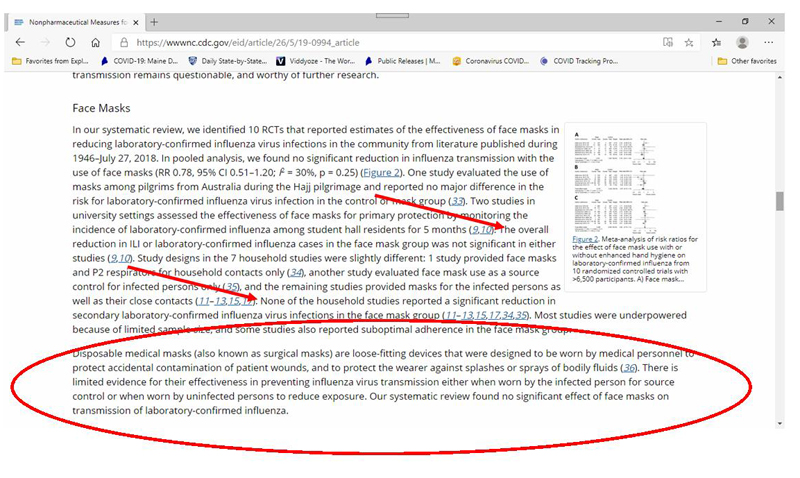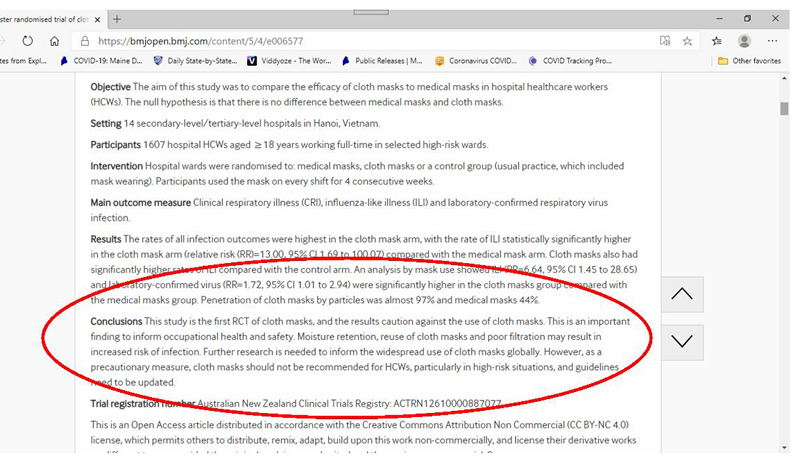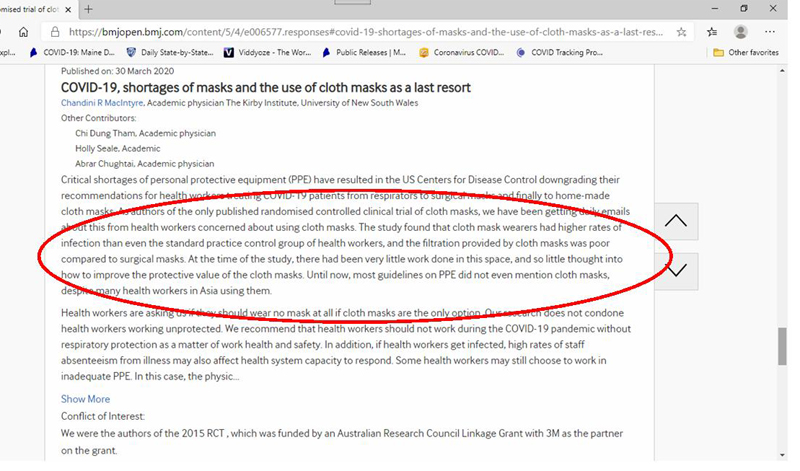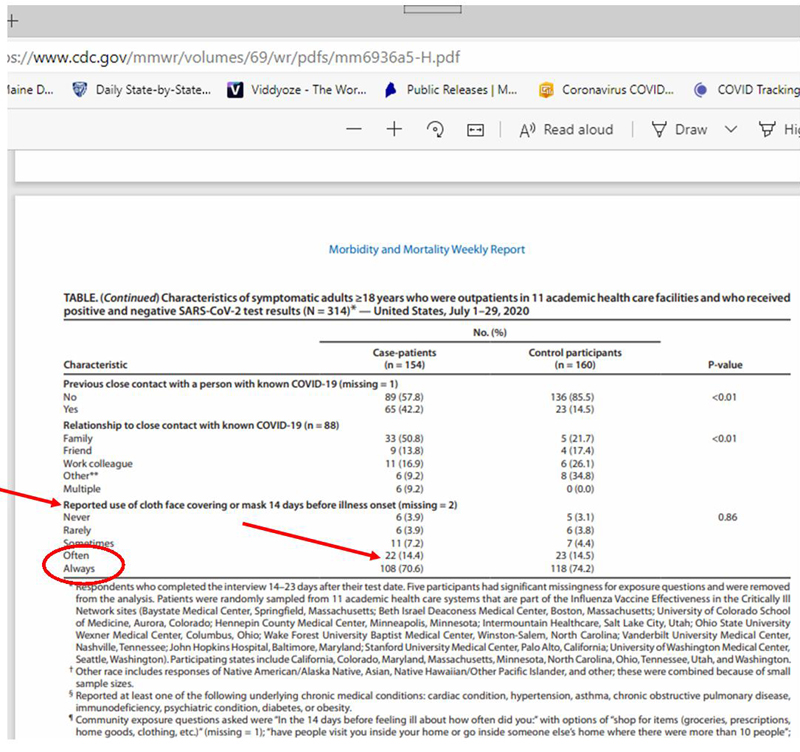The Data Shows Prolonged Face Mask Use Increases Risk of Catching Respiratory Illness
By: David Deschesne
Fort Fairfield Journal, November 4, 2020
EDITOR’S NOTE: FOR SCREEN SHOTS OF THE REFERENCED DOCUMENTS CITED HEREIN, PLEASE SCROLL TO THE BOTTOM OF THIS PAGE IN THE FOOTNOTE SECTION
The recent rise in COVID-19 cases in Maine could be linked to the prolonged use of face masks by the general public. Scientific data collected in randomized controlled trials over the past sixty years has shown consistently that the use of face masks to stop respiratory viruses is not only ineffective, but face masks may actually cause an increase in respiratory illnesses such as influenza and COVID-19.
Maine’s governor, Janet “Big Sister” Mills has been mandating face masks among the public since early Spring ostensibly to stop the spread of COVID-19. However, in light of the voluminous amounts of data that were already available at the time, the move by Big Sister seems to be one based more on psychology and brainwashing than on actual, objective, empirical scientific data.
The U.S. CDC reported a meta-analysis of 10 face mask studies in the February, 2020 edition of its medical Journal, ,Emerging Infectious Diseases1 which concluded face masks do not work to prevent transmission of respiratory viruses.
One of the key studies cited in that CDC report was of 1607 hospital workers in Vietnam, published in the journal ,BMJ Open on April 22, 2015.2 The study concluded that the use of surgical masks to control viral spread (which they are not designed to do, anyway) was negligible and that the prolonged use of the iconic cloth masks, so popular in today’s society, actually increased the cases of respiratory illness significantly.
Furthermore, a more recent study conducted by the US CDC’s COVID-19 Response Team and published in the CDC’s ,Morbidity and Mortality Weekly Report3 showed that there is a 20 times greater chance of catching COVID-19 with prolonged wearing of a face mask when compared to those who never wore a face mask. In that CDC study, it was found that of the 154 new cases of COVID-19, where patients had both a positive PCR test for the purported virus’ RNA particle and real symptoms, around 85% reported they wore a face mask often, or always, up to fourteen days prior to symptom onset. The control group in that study also showed symptoms of some sort of respiratory illness, but had a negative COVID-19 PCR test. In that control group, 88% of the people reported often or always wearing a face mask. Around 4% of both groups reported never wearing a face mask prior to symptom onset.
This data continues to be ignored by Big Sister Mills and an establishment corporate media who simply refuses to report these facts on face masks in order to prop up a fear-based narrative that turns people into fearful slaves of the governor, rather than empowered masters of their own lives via a strong, healthy and functional immune system.
Dr. Jay Bhattacharya, M.D., professor at Stanford University Medical School, physician, epidemiologist, health economist and public health policy expert focusing on infectious diseases and vulnerable populations, said he thinks face masks should not be mandated. “Masks have a use in certain settings where people use them properly. So, for instance, in hospital settings and places where you can’t avoid being in very, very close contact with people that are vulnerable,” said Dr. Bhattacharya. “Mask mandates, like I’ve heard some politicians propose, are not supported by the scientific data. For instance, there is no randomized evidence to suggest mask mandates would work to slow the spread of the disease. In fact, for influenza the randomized studies that have been done suggest that they don’t work to slow the spread of the disease.”
To be clear, Dr. Bhattacharya is admittedly not against face mask use when used properly. “As I said, they have appropriate uses in appropriate places. We should take seriously what the scientific evidence is saying and not adopt policies that are far beyond what the scientific evidence has said.”
Most people today aren’t even using face masks correctly. Face masks must be changed out after every hour of use to prevent bacterial growth from building up and being re-breathed. Nearly all people in society wear a mask into a business, then when they leave they’ll hang it under their chin, stuff it in their purse or pocket, or throw it on the dashboard of their car. At the next stop, they take that dirty, contaminated mask, put it on and begin breathing through it, thinking they are “stopping the spread” of a virus, unaware of how their handling of the mask has made it more likely they’ll catch a respiratory illness than if they had worn no mask at all.
Dr. Bhattacharya is also disturbed at the collateral damage done to society when governments irresponsibly mandate face masks when there is no scientific evidence to support that position. “I think there are also enormous social harms caused by these mask mandates. Masks have become a political issue, a partisan issue; you wear a mask if you are a Democrat, you don’t wear a mask if you are a Republican and you look on your fellow citizens and say well, you’re being irresponsible or you don’t care about freedom. I think public health should unite, not divide. Masks, I think, have become an issue, especially these mandates. When it turns into a political issue like this we have to think, as public health workers, very carefully whether we’ve actually done the right thing. I think we’ve done a very, very poor job with the messaging, taking the science seriously, and we’ve created a disunity in the populace around masks – the distrust for one another that public health is not supposed to create.”
In addition to Dr. Bhattacharya sounding the alarm on face masks, the University of Minnesota’s Centers for Infectious Disease Research and Prevention (CIDRAP) also posted a ,commentary4 co-authored by Dr. Lisa Brosseau ScD, a national expert on respiratory protection and infectious diseases and professor (retired) at the University of Illinois, Chicago (UIC) and Dr. Margaret Sietsema, Ph D, an expert on respiratory protection and an assistant professor at UIC. They noted, “Sweeping mask recommendations – as many have proposed – will not reduce SARS-CoV-2 transmission, as evidenced by the widespread practice of wearing masks in Hubei province, China before and during its mass COVID-19 transmission experience earlier this year. Our review of relevant studies indicates that cloth masks will be ineffective at preventing SARS-CoV-2 transmission, whether worn as source control or PPE……we continue to conclude that cloth masks and face coverings are likely to have limited impact on lowering COVID-19 transmission…”
Notes – hyperlinks with respective screen shots
1. ,https://wwwnc.cdc.gov/eid/article/26/5/19-0994_article

2. https://bmjopen.bmj.com/content/5/4/e006577

The next screen shot is an addendum added by the study’s authors in the above link in footnote 2

3. https://www.cdc.gov/mmwr/volumes/69/wr/pdfs/mm6936a5-H.pdf


Source: Fortfairfieldjournal





Leave a Reply
You must be logged in to post a comment.